四川省眉山市东坡区齐通中学共同体2024-2025学年七年级下学期期末考试英语试题
试卷更新日期:2025-07-02 类型:期末考试
一、阅读理解A
-
1.
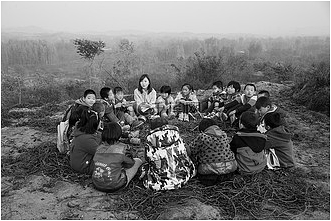
In my school, there's an outdoor classroom. It is not the same as an indoors classroom.we have no chairs, tables or computers. We sit on some stones. In class we put books on our legs and write on them. It's a bit hard when it's windy. Paper can fly high in the air and we have to jump to get our paper back.
Every week, each class can use the outdoor classroom for one lesson. My class usually has it on Friday. We finish the first two lessons in our indoor classroom, and then we have a 20-minute break. After the break, it's time for us to move. Everyone is excited. We talk and laugh all the way to the outdoor classroom. We always have lots of fun there. There are lots of big trees around the outdoor classroom, so it's cool to have the class in the outdoor classroom even in hot summer. We have many birds' visits each time we are there. Some are quite nice, and we can hear lovely songs from them. Some are nasty, and we get bird poo (粪便) on our heads.
Nothing is perfect, right? Every coin has two sides.
(1)、When does the writer use the outdoor classroom on Friday?A、In the first lesson. B、In the second lesson. C、In the third lesson. D、In the fourth lesson.(2)、The underlined word "nasty" has the closest meaning to "________".A、bad B、noisy C、funny D、friendly(3)、What's the best title for the text?A、Come to My Classroom. B、Study in the Open Air. C、Tree in Our School. D、Birds in the Tree.二、B
-
2. Opening Hours:
Monday 09:00-17:00 Friday 08:00-15:00
Tuesday 09:00-17:00 Saturday 09:00-12:00
Wednesday 09:00-20:00 Sunday Closed
Thursday 09:00-17:00
Library Rules:
 All students must have a library card.
All students must have a library card. Computers are for schoolwork only.
Computers are for schoolwork only. No food or soft drinks in the library. Students can only bring their own water bottles.
No food or soft drinks in the library. Students can only bring their own water bottles. No running or shouting in the library.
No running or shouting in the library. Mobile phones must be off once you walk into the library.
Mobile phones must be off once you walk into the library. Students cannot bring textbooks into the library.
Students cannot bring textbooks into the library. Students can borrow three books at a time.
Students can borrow three books at a time. Students must return (归还) the books on time. Late return will result in a fine (罚款), 1 dollar a day for each book.
Students must return (归还) the books on time. Late return will result in a fine (罚款), 1 dollar a day for each book. The library has after-hours return service (服务). Please leave the books in the blue box at the back of the library.
The library has after-hours return service (服务). Please leave the books in the blue box at the back of the library. The books with "Read Here" labels (标签) cannot be borrowed. They can be read only in the library.(1)、If Tony is free from 6:00 pm to 8:00 pm, he can go to the library on ________.A、Monday B、Tuesday C、Wednesday D、Thursday(2)、What can students bring into the library?A、
The books with "Read Here" labels (标签) cannot be borrowed. They can be read only in the library.(1)、If Tony is free from 6:00 pm to 8:00 pm, he can go to the library on ________.A、Monday B、Tuesday C、Wednesday D、Thursday(2)、What can students bring into the library?A、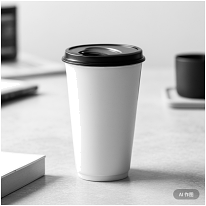 B、
B、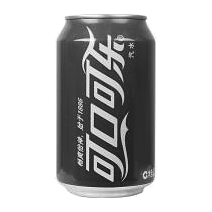 C、
C、 D、
D、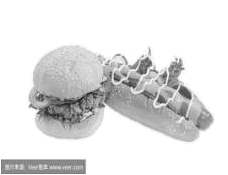 (3)、If Jane returned three books three days late, how much should she pay?A、$3. B、$6. C、$9. D、$12.(4)、The passage is probably a ________.A、story B、poem C、notice D、report
(3)、If Jane returned three books three days late, how much should she pay?A、$3. B、$6. C、$9. D、$12.(4)、The passage is probably a ________.A、story B、poem C、notice D、report三、C
-
3. Do you know anything about the balance (平衡) of nature? Here is an example.
Not many years ago, some farmers were worried because hawks (鹰) took many of their chickens, so the farmers killed many hawks. They no longer had to worry about their chickens. But then they had new worries. Mice ate the farmers' food. How did this happen? Hawks ate not only chickens but also mice. They ate more mice than chickens. But the farmers did not know this. When they killed many hawks, they changed the balance of nature.
Changing the balance is bad for nature. Sometimes when people move into a new place, they often cut down many plants. Some of these plants are good for animals. If the animals cannot find food to eat, they will die or have to leave the place.
Here is another example. In a place of the United States, the giraffes there ate a kind of rose; the lion there ate the giraffes. The number of the giraffes, lions and wild roses did not change much if people kept things as they were. But people killed many lions to protect the giraffes. Soon there were so many giraffes that they ate up all the roses. Then the giraffes began to eat leaves of young trees. These trees were important to people. So people thought of ways to protect trees. Now the giraffes had nothing to eat, and many of them died. This was another lesson from nature.
Please always keep this in mind: it's important for us to keep the balance of nature.
(1)、How does the writer start the passage?A、By giving a fact. B、By asking a question. C、By giving an opinion. D、By telling a life story.(2)、Which one shows the right relation (关系) of giraffes, lions, roses and trees?A、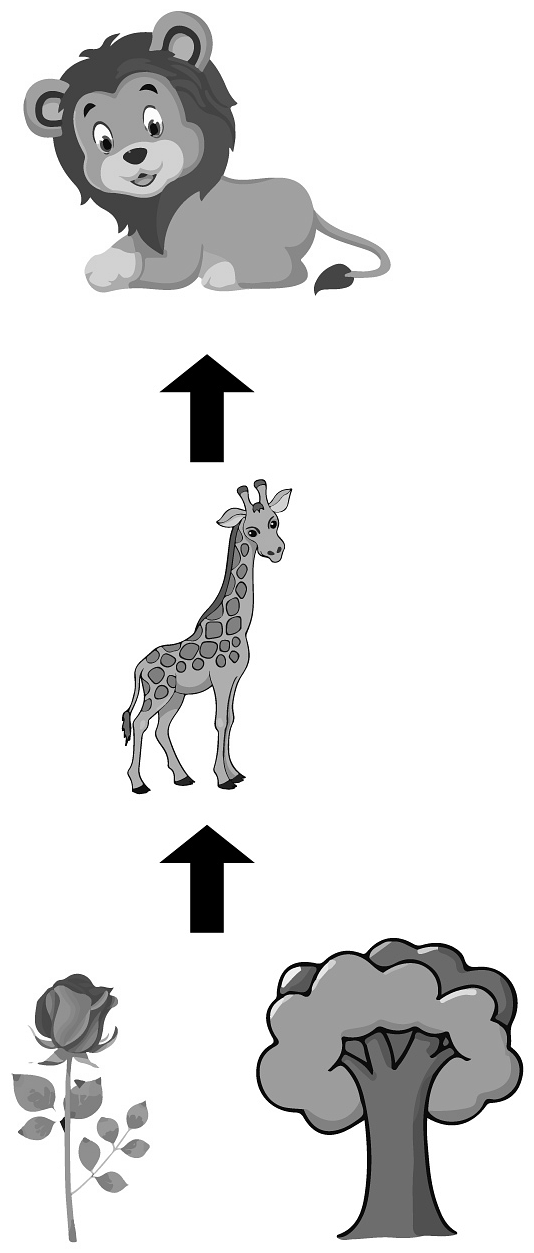 B、
B、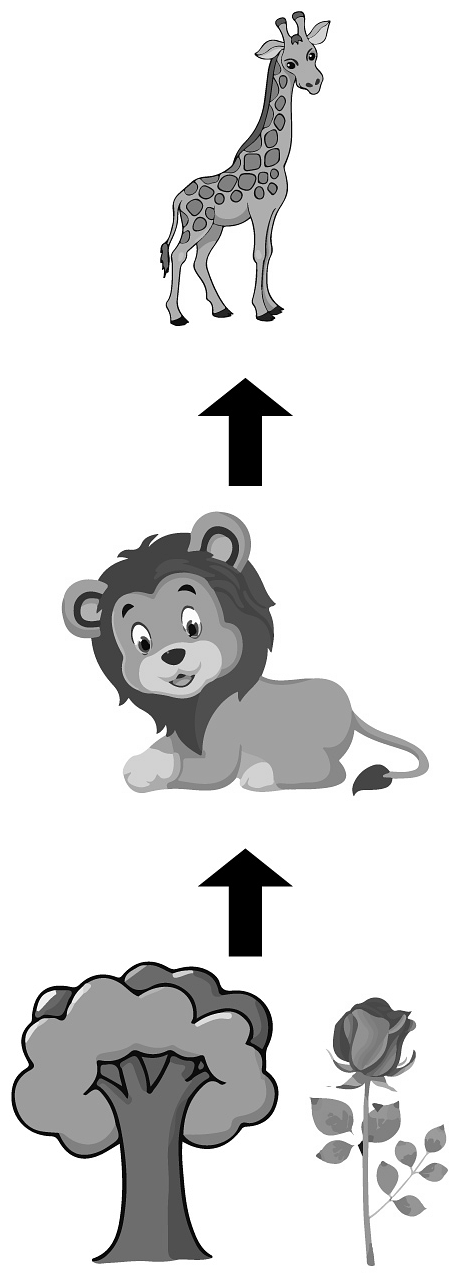 C、
C、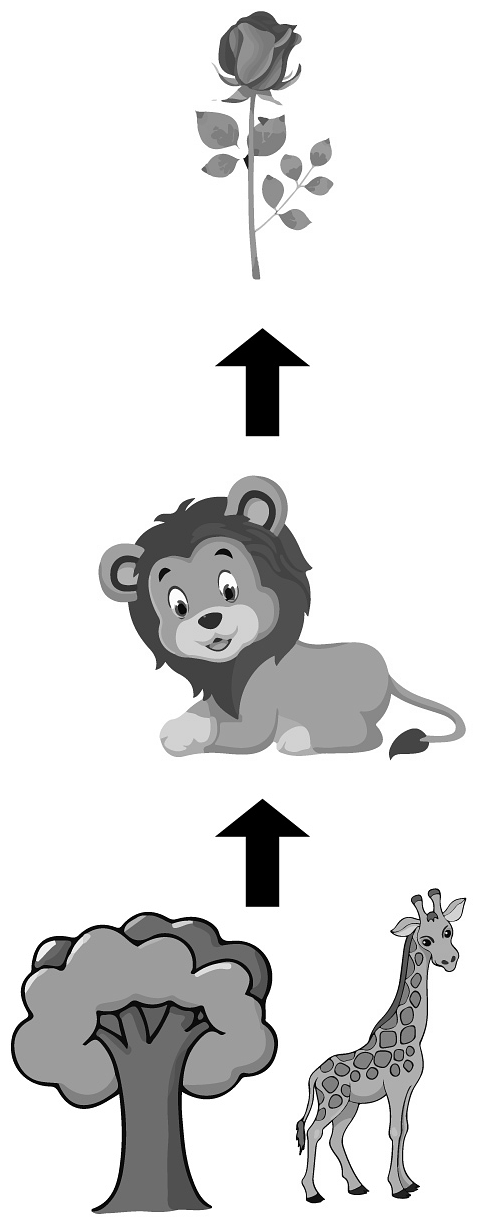 D、
D、 (3)、What is the main idea of the passage?A、Farmers can't change the balance. B、Animals are bad for grains and plants. C、People can always learn from nature. D、We should not change the balance of nature.(4)、In which unit of a textbook can you find this passage?A、Unit 1. Subjects and clubs. B、Unit 2. Art and music. C、Unit 3. Animals and people. D、Unit 4. Language and countries.
(3)、What is the main idea of the passage?A、Farmers can't change the balance. B、Animals are bad for grains and plants. C、People can always learn from nature. D、We should not change the balance of nature.(4)、In which unit of a textbook can you find this passage?A、Unit 1. Subjects and clubs. B、Unit 2. Art and music. C、Unit 3. Animals and people. D、Unit 4. Language and countries.四、D
-
4. Eating healthy and working out are good habits. Being careful with money is a good habit, too. It's not as difficult as you think. Remember these three words: save, spend, share.
Most young kids don't have real jobs. But you can still make money. Ask your neighbors (邻居). You can also talk to your parents. They could give you some money if you help with the housework in your home. And you can put your money in a bank. Banks keep your money safe.
You work really hard to make money and may want to spend it. Before you buy something, ask yourself if you need it or want it and if you have enough money for it. Set goals (目标) for yourself. Maybe you want to buy a toy. That's a short-term goal. Or maybe you want to buy a car one day. That's a long-term goal. Make a plan for how much you will spend. Keep to your plan. And remember your goals.
You can also use your money to help others. Think about what is important to you. Do you like animals? Donate (捐赠) your money to an animal shelter (收容所). Even a little help can make a big difference.
Remember: save, spend and share. Being smart with money is a good habit. Your future self will thank you!
(1)、How many ways to be smart with money in this text?A、One. B、Two. C、Three. D、Four.(2)、What is Paragraph 3 mainly about?A、How to spend money. B、How to set goals. C、How to keep to your plan. D、How to save enough money.(3)、The structure (结构) of the text may be ________. (①=Paragraph1)A、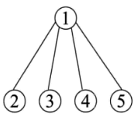 B、
B、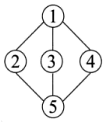 C、
C、 D、
D、 (4)、Who is the text written for?A、Parents. B、Children. C、Teachers. D、Businessmen.
(4)、Who is the text written for?A、Parents. B、Children. C、Teachers. D、Businessmen.五、第二节 任务性阅读(共5个小题;每小题2分,满分10分)
-
5. 从短文后的选项中选出可以填入空白处的最佳选项。选项中有一项为多余选项。
I am Ellen Black. I have two sons. Henry and Ivan and a daughter Winnie. Henry is 8years old, Ivan is 10 and Winnie is 12. For them, healthy breakfast is very important.
They don't have the same eating habits. But I want them to eat healthy food. So it's not easy for me to prepare breakfast for them.
Henry is a basketball star in his school. He always plays basketball in the morning. He always has three eggs, some chicken and milk. He must have breakfast at 6:00 in the morning.
Ivan likes a vegetable salad for breakfast. Tomatoes and carrots are his favourite vegetables. But he doesn't like green tomatoes. He always has a vegetable salad and some rice porridge for breakfast.
My daughter Winnie thinks she is fat. So she only likes some fruit for breakfast. She likes bananas, pears and apples. She doesn't like strawberries or oranges. I always ask her to have some milk..
I am busy every morning, but it's worth (值得的).
A. They are all students.
B. He only likes red ones.
C. They want to eat what they like.
D. So he must eat well for breakfast.
E. I think milk is healthy and good for health.
F. After breakfast they all go to school by bus.
六、语言运用。第一节(共5小题,每小题2分,满分10分)
-
6. 根据对话内容,从对话后的选项中选出适当的选项补全对话。
A: Hi, Mary. What do you want to do this Sunday?
B: I want to go to the zoo to see animals.
A: Of course! I like animals very much, too.
B: Great!
A: Pandas. They are very cute. What about you?
B: Elephants.
A: Are there any elephants in the zoo?
B: Yes.
A: OK.When and where can we meet?
B: What about 9:00 a.m. at my home?
A: Sure. See you.
A. Is it OK with you?B. How can we get there?
C. Why do you like them?
D. Would you like to join me?
E. And they are from Thailand.
F. What animals do you like best?
G. They are really kind and friendly.
七、第二节(共15小题;每小题1分,满分15分)
-
7. 阅读下面短文,从短文后各题所给的A、B、C、D四个选项中选出可以填入空白处的最佳选项。
I'm Bob and I'm a student of No.2 Middle School. We have a lot of1 in our school. I think some of them are good2 us , but others are not so good.
We have to3 the school uniform. I think it's good. If we don't have this rule, some students will wear expensive (昂贵的) clothes. They will think4 about their clothes, but not study. We5 at six in the morning. Then we6 to school before 7 o'clock. We can't be7 for school. And we have to listen to8 in class. All of these rules are important for our study and I like9.
We can't10 mobile phones to school. I don't think it's a good11. Sometimes our parents are12 and can't get home on time. They need to13 us about that. If we don't take phones,14can they call us? Also, we can't go to the movies on weekends. I know we should study hard, but we need15 to relax, too.
(1)A、computers B、rules C、subjects D、classrooms(2)A、for B、at C、to D、with(3)A、buy B、make C、wear D、sell(4)A、little B、well C、best D、more(5)A、get up B、get out C、go to bed D、Have lunch(6)A、arrive B、get C、leave D、cross(7)A、early B、friendly C、absent D、late(8)A、classmates B、teachers C、parents D、friends(9)A、they B、their C、theirs D、them(10)A、take B、fight C、drive D、work(11)A、idea B、ability C、grade D、lesson(12)A、strict B、easy C、busy D、free(13)A、say B、tell C、speak D、read(14)A、why B、when C、where D、how(15)A、class B、day C、time D、life八、根据句意和首字母、音标提示,将相应单词的正确形式完整地填写在答题卡上(每空一次)
-
8. If you stay up late at night, you may feel s the next morning.9. Susan likes blue, so the blue jacket may b to her.10. The /'peŋgwin/ is a kind of bird. It can't fly, but it can swim fast.11. Can you lend me your dictionary, Mary? M is left at home.12. This year, my g is to learn to play the piano.
九、第二节(共10小题;每小题1.5分,满分15分)
-
13. 阅读下面短文,在空白处填入1个适当的单词或括号内单词的正确形式。
Henry is a middle school student. There are too many (rule) in his school. First, he can't wear what he (like). He must wear the school uniform on school day. Second, he (have) to get to school on time. He can't arrive late school. Third, he must keep (quiet) in the school library. Fourth, he can't take his mobile phone into his classroom. He must turn it before put it into his locker. Fifth, he must clean his desk and can't make it (tidy). In class, he must focus on (learn).
Three rules are strict. He knows his school makes these rules to help him to be better person than before. So he always (follow) them. What do you think of these school rules?
十、第三节(共5小题;每小题2分,满分10分)
-
14. 阅读下面短文,根据其内容,补全表格中所缺信息。请将答案按编号依次填入表格内题号后横线上。每空限填一词。
Do you know what a healthy meal is? To help the people know this, the US makes a new food diagram called MyPlate. Parents can use it to develop healthy eating habits for their children and the whole family.
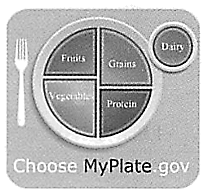
MyPlate is a picture of a plate showing how much food you should eat every meal. The food are fruits, vegetables, grains (谷物), protein (蛋白质), and dairy. Fruit includes any fruit or 100 percent fruit juice. Your fruit can be fresh, frozen, canned, dried, or whole, cut. The goal is to provide your child with vital nutrients (营养成分). Choose veggies that are colorful, such as red peppers, dark green spinach, or yellow squash. Protein food includes both animal (meat, poultry, seafood and eggs) and plant sources (beans, peas, soy products, nuts and seeds). Grains include any food made from wheat, rice, or other cereal grain.
The picture helps people eat well. And it is an easy way for us to know how to eat well. Look at the plate, we can see that fruits and vegetables should make up half of a meal. It also means that fruits and vegetables should make up about half of what we eat each day. Smaller parts are grains, protein, and dairy. If we eat like this we can keep healthy.
helps us have a healthy eating .
shows us how much we should eat every .
MyPlate
looks like a .
tells us half of the food we should eat every day is and vegetables.
is an easy way for us to know to eat well.
十一、书面表达(满分25分)
-
15. 假设你是李华,你的美国笔友 Tom 想了解你保持健康的方式,请你根据以下提示给他写一封邮件。
提示:
1. 你喜欢的运动(如跑步、游泳等)及运动的频率;
2. 你的饮食习惯(如多吃蔬菜、少吃垃圾食品等);
3. 你的作息时间(如早睡早起等)。
要求:
1. 邮件内容须包含以上提示要点,可适当发挥;
2.不得出现真实的人名、校名等相关信息;
3. 词数80左右。
Dear Tom,
I am glad to hear from you!
_________________________________________________________________________________________________________________________________________________________________________________________________________________________________________________________________________________________________________________________________________________________________________________________________________________________________________________________________________________________________________________
Yours,
Li Hua
-
-
-
-
-
-
-
-
-